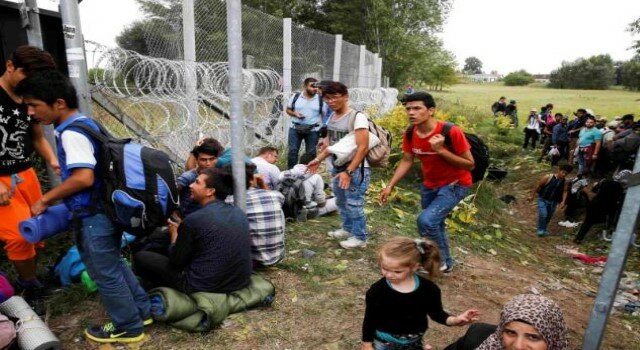While Hungarian police patrolled their border fence on horseback and workers uncoiled the razor-wire and steel mesh that would finish it, Austria, the Netherlands, the Czech Republic and Slovakia all rushed to join Germany in tightening border controls.
Hungarian police say two crossings on the border with Serbia have been closed to all traffic as stricter rules about the entry of migrants are applied.
More than 15,000 migrants walked across Austria’s border from Hungary on Monday, a record since the start of the crisis.
Prime Minister Viktor Orban has indicated that asylum requests from migrants trying to enter Hungary from Serbia will be rejected because Serbia is a safe country where migrants do not risk war or persecution.
Hungary’s militaristic response to the crisis has caused turmoil at the border, with some refugees attempting to storm the fence and others beginning a peaceful sit-down protest and chanting “shame on you”.
Austria would introduce similar controls to Germany’s as of midnight (2200 GMT), an Interior Ministry spokesman said.
Speaking at a press conference after their talks here, the two leaders said they had called for a refugee summit in the coming week during a joint telephone conversation with European Council President Donald Tusk.
It was chaos at the Horgos II border post, where Hungarian police allowed only a few migrants at a time through a small gate, a line of hopefuls snaking down the road into Serbia.
She stressed her country, which has already accepted 630,000 refugees from its wartorn neighbour, had been overwhelmed by the numbers, putting “immense strain” on its economy, public services and infrastructure.
At Merkel’s side, Austrian Chancellor Werner Faymann said that “no one who is in search of protection should lose their lives”, and warned of a “humanitarian crisis” if there is not quick and decisive action.
Vulin said that the border crossings should be open, while refugees should be allowed to seek for asylum, or else “the situation could slip out of control”.
Germany’s interior minister is backing the idea of cutting European Union funding to countries that refuse to share the burden of hosting refugees.
The United Nations High Commissioner for Refugees, however, describes the majority of people arriving in Europe this year as refugees.
Determined opposition from a core of former Communist eastern states blocked efforts by Germany and France to secure agreement for a proposal by the European Union executive to relocate 120,000 people from frontier countries according to mandatory national quotas. More than 9,000 entered on Monday, a record for the year. Hungarian officials began distributing food to migrants but refused to let them in, sparking frustration.
Long queues formed in no-man’s land at metal containers built into the fence, where migrants were expected to register, though only a handful were seen entering.
